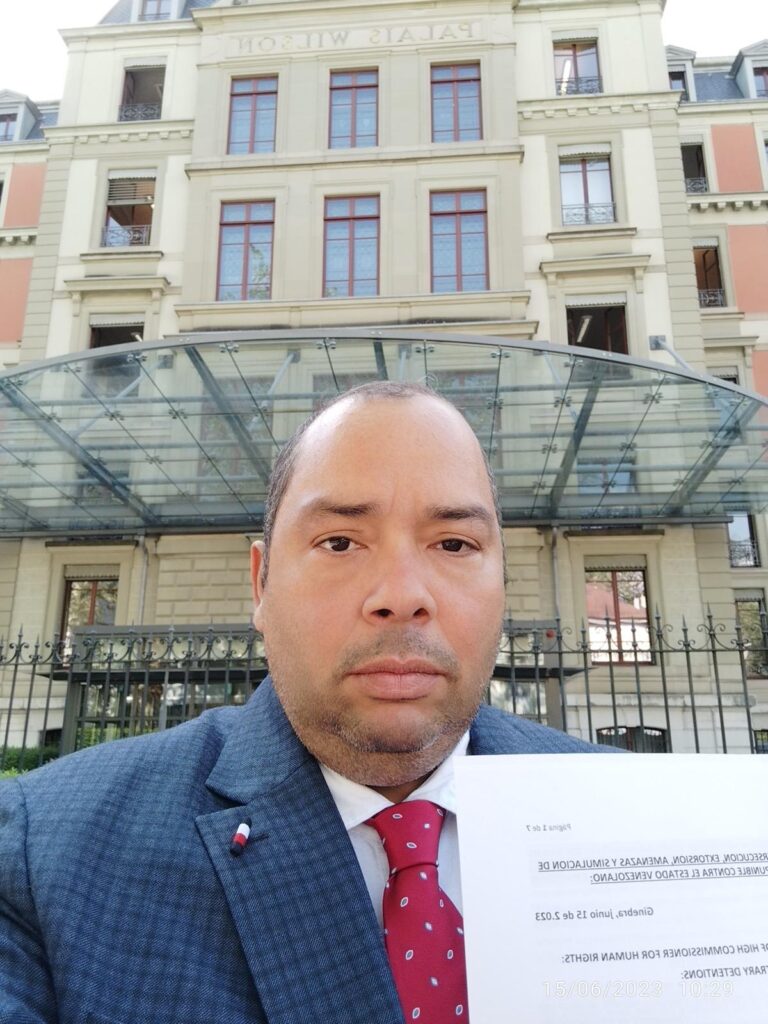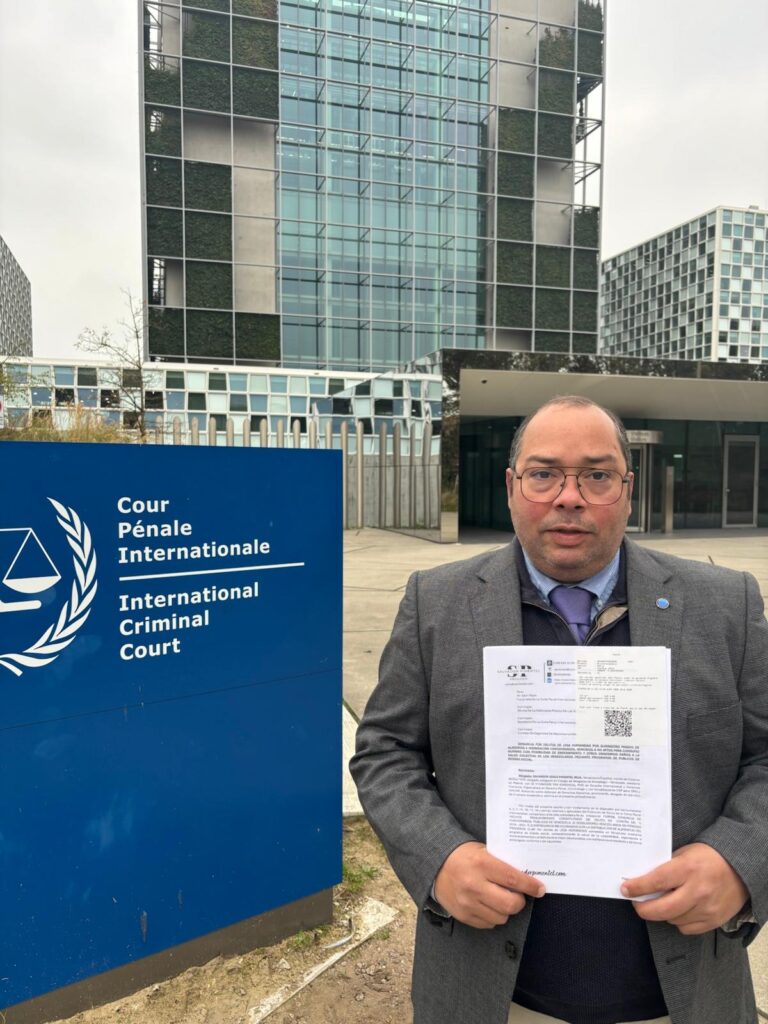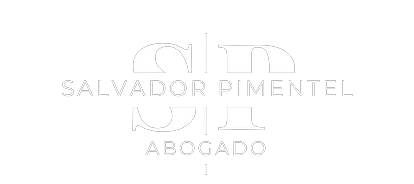By Dr. Salvador Jesús Pimentel Roja
International Legal Consultant in Criminal Law, Human Rights, and Transnational Justice Forced into exile by the Maduro regime.
Madrid, September 23, 2025
Just weeks ago, in a solemn chamber of the Palais des Nations in Geneva, the world looked at Venezuela—not with pity, but with collective shame. https://www.ohchr.org/en/hr-bodies/hrc/ffmv/index

It wasn’t a political speech. It wasn’t an opposition outcry. It was a report—cold, methodical, and backed by evidence—presented by the United Nations Independent International Fact-Finding Mission on Venezuela, led by Portuguese jurist Marta Valiñas. And what it revealed leaves no room for euphemisms: between July 2024 and January 2025, the Venezuelan state arbitrarily detained over 2,200 individuals. Five died in custody. Two hundred and twenty were children and adolescents.
To detain a child for thinking differently. To kill a young man under state custody. To imprison journalists without warrants. To silence NGOs with laws disguised as “oversight.” This is not instability. It is a crime against humanity. And international law says so. The evidence says so. The global conscience, no longer able to look away, says so.
The Report the regime tried to bury Is now a legal weapon. When Venezuela’s delegation dismissed the report as a “political parody,” it wasn’t defending sovereignty—it was confessing impotence. The documentation—testimonies, dates, names of officials, security vehicle plates, forged arrest warrants—cannot be erased with diplomatic rhetoric.
Argentina, Chile, Peru, and Uruguay demanded immediate releases. Spain and the European Union condemned the criminalization of the press. Canada and Guatemala proposed targeted mechanisms to monitor laws designed to suffocate civil society. These are not “interventions.” They are responses to international obligations violated.
And now, the stakes have escalated. The Cartel de los Soles—headed by Nicolás Maduro and other regime elites—has been officially designated as a Specially Designated Global Terrorist group by the U.S. Treasury Department https://ofac.treasury.gov/recent-actions/20250725 Tren de Aragua, Venezuela’s most violent criminal syndicate, has also been labeled a Foreign Terrorist Organization by the U.S. State Department. We await the European Union’s updated terrorist list in October 2025. https://www.europarl.europa.eu/doceo/document/RC-10-2025-0366_EN.html
From my desk in Madrid, where my colleagues and I review case files, prepare legal complaints, and speak daily with victims who still tremble when answering the phone, I know this report is not an obituary. It is an indictment. The prelude to a legal reckoning that, if pursued with rigor, could redefine Latin American jurisprudence.

The ICC is a door opens when national justice closes. In The Hague, the Appeals Chamber of the International Criminal Court recently removed Prosecutor Karim Khan from the “Venezuela I” investigation. This was not a setback—it was a course correction. While the previous prosecutor hesitated, the evidence compiled by the UN Mission—and by organizations like ours—is ready to be integrated into concrete indictments under Article 7 of the Rome Statute: political persecution, unlawful imprisonment, torture, enforced disappearance.
This is about individual criminal responsibility. Not “the government.” Not “the system.” Names. Signatures on operation orders. Voices on recordings. Fingerprints on intelligence documents.
At the Venezuelan Observatory Against Money Laundering (OVLC), we don’t just trace stolen funds. We trace the link between repression and corruption. Behind every arbitrary detention is a bribe. Behind every NGO raid, a shell company laundering assets in Europe. Behind every imprisoned journalist, a general profiting from illegal mining in protected indigenous territories.
This is not a political conflict. It is a transnational criminal ecosystem. And it can only be dismantled with transnational legal tools.
The U.S. Naval Deployment is a “Strategic Turning Point”. It’s not the first time I’ve said it, while diplomats debated in Geneva, another front quietly mobilized: the deployment of a U.S. naval fleet near Venezuelan waters, officially tasked with intercepting drug traffickers tied to the regime. But intelligence sources suggest the mission’s scope may extend further—to neutralize or capture Nicolás Maduro and senior officials implicated in international crimes.
This is not a unilateral intervention. It is a multilateral response to a crisis that has spilled across borders. And with it, the possibility of regime change becomes real—not through rigged elections or backroom deals, but through justice.
What Comes Next? I am thinking in Reconstruction, Return, and Justice. Are you agree?Once Venezuela is recovered—and it will be—restoring institutions won’t be enough. We must rebuild trust. And for that, the exiled will return. Not as victims, but as agents of justice. As lawyers, judges, defenders, academics, journalists. As citizens who remember.
We will return to open case files. To initiate prosecutions. To document every crime. To ensure that perpetrators do not hide behind amnesties or silence. We will return to teach the next generation that law is not a tool of power, but of dignity.
And even after the country is restored, the international pursuit will continue. Because many perpetrators are abroad. Because stolen assets sit in European banks. Because laundering networks remain active. Because transnational justice has no expiration date.
Another important point: The Victims Are Not Statistics, they are faces in our memory. I do not write this as an analyst in a glass tower. I write this as a lawyer who fled his country to defend young people who would otherwise be imprisoned or persecuted. I write this as an exile who carries the guilt of those left behind. I write this as a father who sometimes explains to his children why their grandmother isn’t with them like other families.
I remember students arrested in Anzoátegui for carrying a flag, journalists beaten in police stations for filming protests, colleagues from Foro Penal detained for defending just causes. This is not just repression, it is the criminalization of professions and the suppression of freedoms.
For those I know, for those without a voice, for those who cannot return, this is for them. They don’t need symbolic solidarity. They need justice. They need someone, somewhere, in some court, to say: «This will not go unpunished.» Exile is a trench, not a Defeat.
Those of us far from home didn’t leave because we surrendered—we were forced to. But we’ve repositioned strategically. From Madrid, I can do more damage to the regime than if I were imprisoned or persecuted. Our team abroad has filed complaints with the ICC. We’ve mobilized legal networks in Brussels, Washington, and beyond. And because of this, we now stand on the threshold of freedom.
My call is to join us. Law, when practiced with ethics and courage, knows no borders. And as long as there is a victim without justice, a stolen asset untraced, or a crime unprosecuted, we will keep litigating, denouncing, educating. Connecting the dots others refuse to see.
The path ahead, from denunciation to prosecution. The coming weeks will be decisive. We are working on four fronts: ① Integrating the UN report into the ICC investigation, with complementary evidence linking senior officials to specific crimes; ② Activating exequatur procedures in Spain and other European jurisdictions to enforce Venezuelan civil and criminal judgments against foreign assets; ③ Intensifying diplomatic and media pressure for the European Union and its member states to recognize the Cartel de los Soles and Tren de Aragua as international terrorist and drug trafficking organizations, and; ④ Publishing a global strategic report, in collaboration with universities and research centers, mapping how repression is financed through state-sponsored money laundering.
The mirror doesn’t lie. Venezuela stands before an international mirror that reflects, without mercy, the regime’s architecture of terror. But it also reflects something else: the real possibility of justice. This is not naïveté. It is strategy. It is law. It is duty.
To those who still doubt the power of transnational justice, I say: look to Chile, Argentina, Libya, Sudan and recently, Nepal. See how, sooner or later, dictators end up in court. Not by magic. But because lawyers, victims, judges, and citizens refused to surrender.
We will not surrender either. I promises you.
